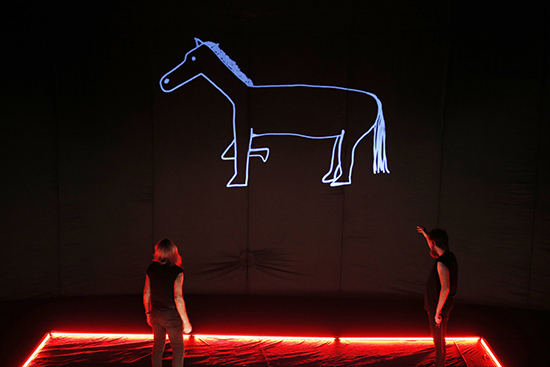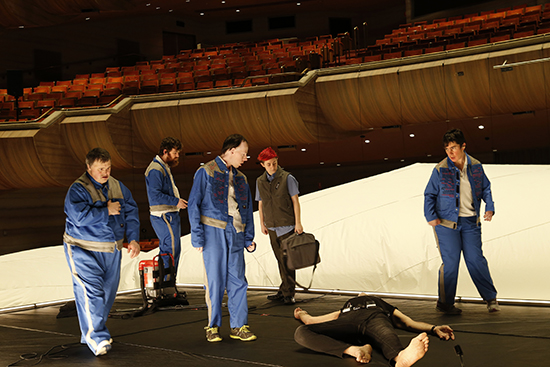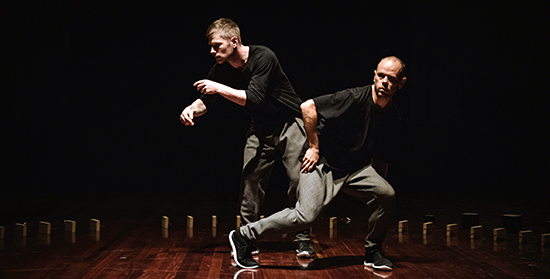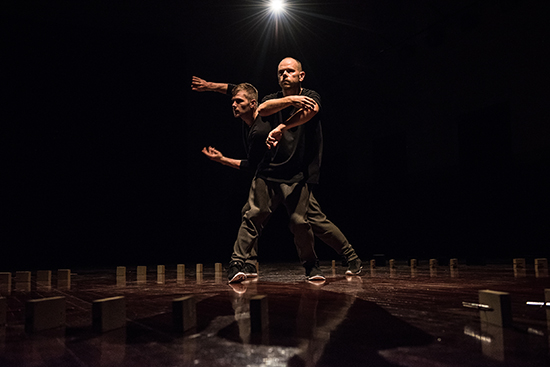Beautiful failure vs fetishised perfection
Jonathan W Marshall: Lady Eats Apple; Meeting

Lady Eats Apple, Back to Back Theatre, Melbourne season
photo Jeff Busby
Lady Eats Apple, Back to Back Theatre, Melbourne season
Back to Back Theatre, Lady Eats Apple
Back to Back’s Lady Eats apple is a curious work. A parapsychologist (Brian Lipson) tests the ability of God (Scott Price) to predict which animals are depicted on a set of flash cards. An annoyed Price petulantly asserts his power and determines to create man “in his own image.” Given the mixed ability cast, the irony is clear, but the larger dramaturgy less so. Lipson enthuses that in this newly forged dramatic scenario, he could play “an old god,” but Price cuts him off, insisting Lipson is “a forgotten one.”
These lurches between dramatic framings characterise Lady Eats Apple, often giving it a throwaway feel. Few dramaturgical lines are followed through, and some are (apparently intentionally) over-extended. As a third wheel in the tragedy of the Fall of Man, Lipson is unable to fully occupy the role of God’s avatar Satan (though he is briefly the Snake). Lipson therefore asks God to kill him. The demand is made many times, and when Price finally makes a pistol with his fingers and says “Boom,” Lipson must be repeatedly shot before he dies.

Lady Eats Apple, Back to Back Theatre, Melbourne season
photo Jeff Busby
Lady Eats Apple, Back to Back Theatre, Melbourne season
The production is broadly ‘postdramatic.’ Little develops fully, with performative lines emerging only to trail away. The performers seem to be asking us to muse widely over themes of death, love, disability, respect and imperfection, and so the work never really emerges in any consistent form. This is either a brilliant conceit, or sloppy dramaturgy. Certainly, inconsistency is built into the structure.
Lady Eats Apple is staged inside a huge fabric bubble which includes the audience. The cloth is later pulled back to reveal the seating bank before us, now populated by the cast playing disaffected cleaning staff. Simon Laherty and Sarah Mainwaring engage in a lengthy dialogue in which they describe their desire to touch each other. The banality of Laherty’s language contrasts with the pair’s delicate expression of shared longing. Less effective is the sound-and-light show of the work’s second act, which involves monochromatic oscillating horizontal lines projected onto the fabric as we hear familiar voice-over reflections on near-death experiences, out-of-body transits and being bathed in “warm light” (all of which have been shown not to be universal experiences of life-threatening events but, rather, culturally influenced neuropsychological reactions to non-lethal altered brain chemistry). Chris Abrahams’ droney musical accompaniment is affective, but as far as quasi-existential audiovisual events go, the combination does not compare well with precedents from the 60s-70s from the likes of John Whitney, the Joshua Light Show or Harry Smith. Overall, Lady Eats Apple is an intriguing, if not wholly successful, experiment.

Antony Hamilton, Alisdair Macindoe, Meeting, Perth International Arts Festival 2017
photo Gregory Lorenzutti
Antony Hamilton, Alisdair Macindoe, Meeting, Perth International Arts Festival 2017
Antony Hamilton & Alisdair Macindoe, Meeting
Antony Hamilton and Alisdair Macindoe’s Meeting is, by contrast, a study in perfection and its human limits. An intricate dance between two people and 64 bluetooth-controlled percussion automata, the piece reflects a superb simplicity (the basic conceit of this exchange) with maddening complexity (number-structures and rhythms which strain human capacity).
Movement here takes the form of an expanded version of hip hop popping. Each gesture clicks distinctly into motion, before being sharply cut off, while the physical shapes themselves expand on those of hip hop’s more robotic tendencies. Hamilton especially eases into low, widely supported crouches in which he interdigitates from below into Macindoe’s taller, straighter poses.
Surrounded by a clock-like circle of small brown boxes fitted with pencils which gently tap out wind-up rhythms, the human choreography begins with simple arm raises and other movements reminiscent of a dippy-bird which are executed on a single plane, before increasingly complex twists and rotations through shoulders and other joints arise. Pace rises and falls. The accents of the percussion signal the commencement and change of movement, while the actual gestures alternate between coinciding with, or smoothly riding over, these notes. At one point we witness an almost Shaolin battle of to-ing and fro-ing between the pair.

Antony Hamilton, Alisdair Macindoe, Meeting, Perth International Arts Festival 2017
photo Gregory Lorenzutti
Antony Hamilton, Alisdair Macindoe, Meeting, Perth International Arts Festival 2017
The dancers periodically drop out of focus to intone complex number sequences (shades of Einstein on the Beach). These become increasingly ornate and non-sequential (three printed scores rest on stage to assist), leaving Hamilton and Macindoe to garble and grunt irregular patterns beyond their capacity to echo their mechanical accompanists. Automated paradiddles and rhythmic variations attain a highly accelerated pace.
Before the performers exit, they move an assortment of painted found objects (coffee cup lids, plastic tubs, blocks of wood) in front of the now reconfigured automata, and leave them to take centrestage. Having explored a wide range of interlocking rhythmic alternatives, this denouement is a trifle long given few spectators can see well enough to recognise which boxes are acting at which times. Nevertheless, the artists use this formal conceit to partly realise Heinrich von Kleist’s dream of an “über marionette,” so unthinking and superbly automated as to enact human performative perfection, even as the physical performance of the humans approaches but fails to reach such an impossible level. Meeting presents a deliberately self-critical fetishisation of embodied perfection, providing an interesting counterpoint to Back to Back’s theatre of beautiful failure.
–
Perth International Arts Festival 2017: Back to Back Theatre, Lady Eats Apple, director Bruce Gladwin, devisor-performers Mark Deans, Simon Laherty, Romany Latham, Brian Lipson, Sarah Mainwaring, Scott Price, set designer Mark Cuthbertson, projection designer Rhian Hinkley, lighting designer, technical direction Andrew Livingston, bluebottle, composer Chris Abrahams,sound designer Marco Cher-Gibard; Heath Ledger Theatre, 2-5 March; Meeting, choreographer, director, performer Antony Hamilton, instrument design, construction, composer, performer Alisdair Macindoe, costume design Paula Levis, lighting design Bosco Shaw; Studio Underground, State Theatre of WA, Perth, 1-4 March
RealTime issue #137 Feb-March 2017






